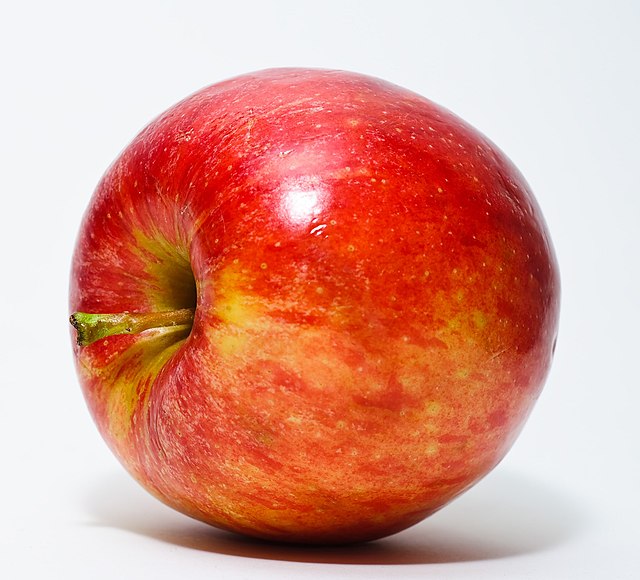omena
From Wiktionary, the free dictionary
From Wiktionary, the free dictionary
(This etymology is missing or incomplete. Please add to it, or discuss it at the Etymology scriptorium.)
omena (uncountable)

Unknown. Often thought to derive from Proto-Finnic *omëna, but the only certain cognates with this form are Ingrian omena and Karelian omena.[1] Estonian õun and Livonian umārz are also often thought to be related, but the words cannot go back to a common protoform. A theory posits that the word is borrowed from an Indo-Iranian language (compare Yidgha [script needed] (åmuno), [script needed] (amun, “apple”)).[1]
omena
| Inflection of omena (Kotus type 11/omena, no gradation) | |||
|---|---|---|---|
| nominative | omena | omenat | |
| genitive | omenan | omenien omenoiden omenoitten | |
| partitive | omenaa | omenia omenoita | |
| illative | omenaan | omeniin omenoihin | |
| singular | plural | ||
| nominative | omena | omenat | |
| accusative | nom. | omena | omenat |
| gen. | omenan | ||
| genitive | omenan | omenien omenoiden omenoitten omenojen rare omenain rare | |
| partitive | omenaa | omenia omenoita omenoja rare | |
| inessive | omenassa | omenoissa omenissa | |
| elative | omenasta | omenoista omenista | |
| illative | omenaan | omeniin omenoihin | |
| adessive | omenalla | omenoilla omenilla | |
| ablative | omenalta | omenoilta omenilta | |
| allative | omenalle | omenoille omenille | |
| essive | omenana | omenoina omenina | |
| translative | omenaksi | omenoiksi omeniksi | |
| abessive | omenatta | omenoitta omenitta | |
| instructive | — | omenoin omenin | |
| comitative | See the possessive forms below. | ||
| Possessive forms of omena (Kotus type 11/omena, no gradation) | ||||||||||||||||||||||||||||||||||||||||||||||||||||||||||||||||||||||||||||||||||||||||||||||||||||||||||||||||||||||||||||||||||||||||||||||||||||||||||||||||||||||||||||||||||||||||||||||||||||||||||||||||||||||||||||||||||||||||||||||||||||||||||||||||||||||||||||||||||||||||||||||||||||||||||||||||||||||||||||||||||||||||||||||||||||||||||||||
|---|---|---|---|---|---|---|---|---|---|---|---|---|---|---|---|---|---|---|---|---|---|---|---|---|---|---|---|---|---|---|---|---|---|---|---|---|---|---|---|---|---|---|---|---|---|---|---|---|---|---|---|---|---|---|---|---|---|---|---|---|---|---|---|---|---|---|---|---|---|---|---|---|---|---|---|---|---|---|---|---|---|---|---|---|---|---|---|---|---|---|---|---|---|---|---|---|---|---|---|---|---|---|---|---|---|---|---|---|---|---|---|---|---|---|---|---|---|---|---|---|---|---|---|---|---|---|---|---|---|---|---|---|---|---|---|---|---|---|---|---|---|---|---|---|---|---|---|---|---|---|---|---|---|---|---|---|---|---|---|---|---|---|---|---|---|---|---|---|---|---|---|---|---|---|---|---|---|---|---|---|---|---|---|---|---|---|---|---|---|---|---|---|---|---|---|---|---|---|---|---|---|---|---|---|---|---|---|---|---|---|---|---|---|---|---|---|---|---|---|---|---|---|---|---|---|---|---|---|---|---|---|---|---|---|---|---|---|---|---|---|---|---|---|---|---|---|---|---|---|---|---|---|---|---|---|---|---|---|---|---|---|---|---|---|---|---|---|---|---|---|---|---|---|---|---|---|---|---|---|---|---|---|---|---|---|---|---|---|---|---|---|---|---|---|---|---|---|---|---|---|---|---|---|---|---|---|---|---|---|---|---|---|---|---|---|---|---|---|---|---|---|---|---|---|---|---|---|---|---|---|---|---|---|---|---|---|---|---|---|---|---|---|---|---|---|---|---|---|---|---|
| ||||||||||||||||||||||||||||||||||||||||||||||||||||||||||||||||||||||||||||||||||||||||||||||||||||||||||||||||||||||||||||||||||||||||||||||||||||||||||||||||||||||||||||||||||||||||||||||||||||||||||||||||||||||||||||||||||||||||||||||||||||||||||||||||||||||||||||||||||||||||||||||||||||||||||||||||||||||||||||||||||||||||||||||||||||||||||||||

From Proto-Finnic *omëna. Cognates include Finnish omena and Estonian õun.
omena
| Declension of omena (type 3/koira, no gradation) | ||
|---|---|---|
| singular | plural | |
| nominative | omena | omenat |
| genitive | omenan | omeniin |
| partitive | omenaa | omenia |
| illative | omenaa | omenii |
| inessive | omenaas | omeniis |
| elative | omenast | omenist |
| allative | omenalle | omenille |
| adessive | omenaal | omeniil |
| ablative | omenalt | omenilt |
| translative | omenaks | omeniks |
| essive | omenanna, omenaan | omeninna, omeniin |
| exessive1) | omenant | omenint |
| 1) obsolete *) the accusative corresponds with either the genitive (sg) or nominative (pl) **) the comitative is formed by adding the suffix -ka? or -kä? to the genitive. | ||

omena
Seamless Wikipedia browsing. On steroids.